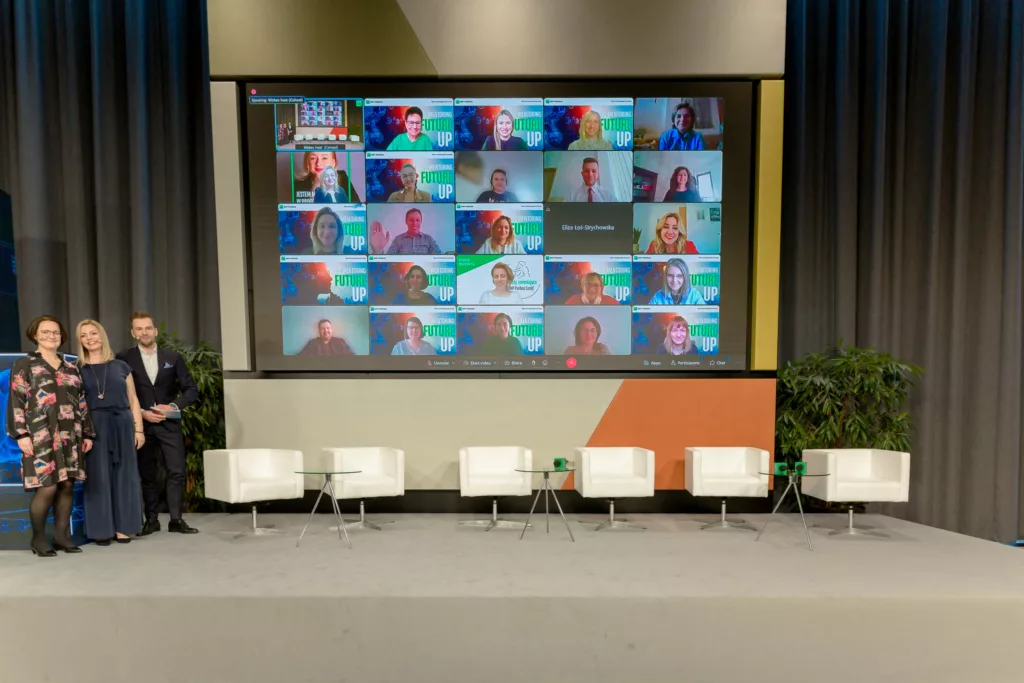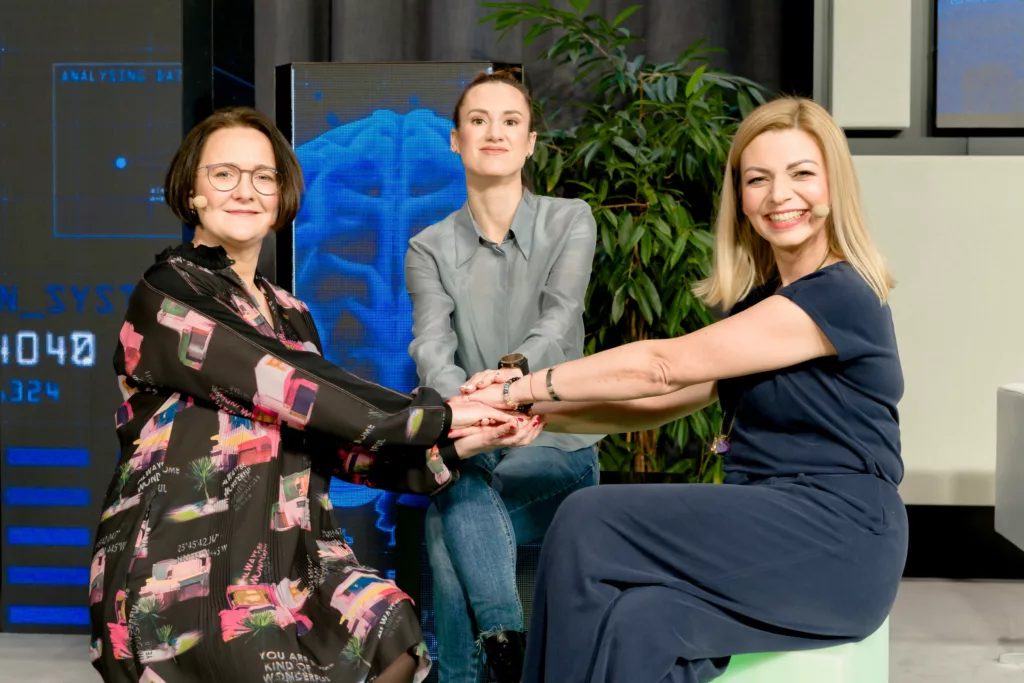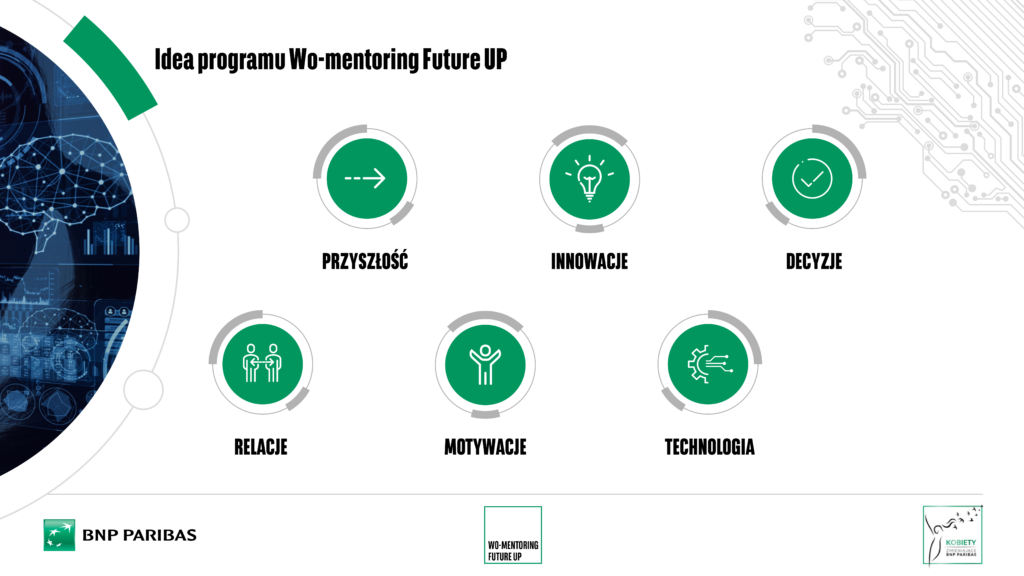Recent years have been experiencing us as humanity quite a bit. Rapidly changing realities, pandemic, war – all of these make our sensitivity to the other grow, rivalry gives way to cooperation, and the idea of sharing proves more important than individual gain. Utopia? Not necessarily. This was proven by BNP Paribas’ Women of Change, which launched a proprietary and innovative mentoring project that is based on the exchange of experiences between people who are not connected to one company or industry.
We talk about the desirability of such projects, the idea behind them, the stages of creation and the effects with Aleksandra Zouner, Managing Director of the Management Accounting and Investor Relations Division at BNP Paribas Bank and Leader of the Thrive Zone, Donata Izdebska, Expert on the topic. Training at BNP Paribas Bank and Leader of the Thrive Zone, Ursula Sabik-Kołodziej, HR Business Partnership Team Leader at BNP Paribas Bank and Leader of the Wo-mentoring Future UP! program, and Szymon Herbec, Partner and Mentoring Practice Leader at Kingmakers .

Your Wo-mentoring Future UP project has entered the next stage of development. What did you feel the moment it took off?
Donata Izdebska: It was an extremely satisfying moment. After many months of preparation, see the project buttoned up to the last button, where all the ideas and concepts that guided us are just now coming to fruition. From the beginning, we wanted to go beyond the standards and offer something that would be the vanguard of mentoring. I think we have succeeded, and our approach will prove to be a breakthrough. We want to boldly go into the future and create reality, understanding the importance and significance of modern technologies. At the same time, we need knowledge and the right tools from the field of mentoring, which we are guaranteed with the support of Kingmakers. This gave us great comfort working on the project.
Let’s go back to the beginning. What initiated the need for such a mentoring program in your organization? Why did you take the direction of expanding your knowledge in the area of new technologies?
Alexandra Zouner: We are developing the Wo-mentoring Future UP project as part of the BNP Paribas Women of Change Program, which has been in place at BNP Paribas Bank for more than 3 years. We operate in various areas, and our zone, the Thrive Zone, focuses on development programs. We are constantly looking for ideas on how we can support women to develop and achieve professional success. The IT industry is growing rapidly, and knowledge of new technologies is often the ticket to reaching the next career levels. Unfortunately, this area is dominated by men. Therefore, a little against the prevailing stereotypes and in accordance with the idea of shape your mind , we decided to support women in technological development and discovering the potential of innovation. It doesn’t matter whether they work in IT or represent the business side – we wanted to provide them with additional value in the form of support from experienced mentors.
Ursula Sabik: The entire program is aimed at formal and informal women leaders who want to actively seek answers to the challenges of the future. The program was originally intended for women, hence the name, but after feedback from the organization we modified the idea. This is because it turned out that men also wanted to join the initiative. Ultimately, we recruited 70 mentoring pairs, including 20 men as mentees. They do not lack courage and willingness to learn, which makes us extremely happy.
What convinced you to work with external mentors?
Szymon Herbeć: Several such programs have been established in Poland, where companies operating in a similar field, but not in competition with each other, implement cross-firm mentoring, in which they exchange mentees and mentors. The goal of these initiatives is not to develop one organization, but to try to build something together in the market. However, I have not heard of one that actually relies on outside mentors. This is a very modern approach, as Ola said – avant-garde. “Before Covid, I had not heard about the need for external mentors between organizations. Now I see that the market is striving to create spaces to share experiences and build cooperation on a completely different level – without competing and wanting to keep the secret of success to themselves. This is a remarkable and fantastic change that we are witnessing.
Alexandra Zouner: Indeed, this change is visible, and we are very pleased. Industries are increasingly intersecting and inspiring each other. We learn from each other – telcos from banking, banking from e-commerce, pharma from FMCG and so on. This trend of not having to invent everything yourself, of being inspired by a solution from another sector and then adapting it to your industry, is truly innovative and enriching. We are opening up to genuinely exchange knowledge and create the so-called “knowledge exchange. A collective brain that everyone can benefit from. In my opinion, this is a revolutionary and sensational approach.

A number of mentors in high positions have been involved in the project. How did you manage to convince them of the project?
Alexandra Zouner: This is just to add that we even already have a list of reserve mentors. The project is so original and innovative that the CEOs, senior managers I talk to directly declare their desire to become mentors in the program. The strength of the BNP Paribas Women of Change Program certainly worked here, as well as our networking, openness and the fact that we are not afraid to go big. Above all, however, it’s a payback for our commitment and courage in action – we organized many brainstorms, launched many contacts. It worked!
How do you prepare mentors and mentees to participate in the program?
Szymon Herbeć: Anyone who wants to be a mentor has to go through an education process. A few people didn’t have to attend this workshop, but only because they had it already. These people knew what mentoring was and how to do it. One of the most important parts of this learning for mentors is to work on turning their managerial muscle of express problem-solving into deep listening and creating space for mentees to grow. Mentees, on the other hand, are fooled into thinking that a mentor, thanks to his inner powers, will pour secret knowledge into them, causing their lives to miraculously work out in their favor: they will get a promotion, a raise, a company car. We make them realize that this is a program that requires effort and work. That this is the case, we often see after the session is over. The fatigue visible on the faces of the mentees is a sign that the meeting was fruitful.
Alexandra Zouner: It was very important for mentees to clarify their goals, meet and learn what mentoring is, and then only arrange what they want to achieve individually. Mentors, on the other hand, had to keep in the back of their minds all the time the importance of sharing experiences in mentoring. Occupying high positions, they have already come a long way, opened many doors, achieved much, but they should share it with humility. In this project, partnerships, authenticity and relationships that build this common path are extremely important.
The whole project seems to have been perfect, but it was certainly not without its challenges. What turned out to be the biggest one?
Donata Izdebska: There is no denying it: the time and energy the program required. Combining this project with work and other responsibilities was not easy. Especially since we have set really ambitious goals. However, the satisfaction of completing them really makes up for a lot. For me personally, it was also quite a challenge to properly pair mentors and mentees. Many people, with different professional experience, different needs, expectations and desires, applied to us. Putting it together was a complicated and lengthy process, but it worked. I think both mentors and mentees will be happy with their pairs.
Alexandra Zouner: In general, the project itself was quite a challenge. We didn’t have a point of reference, because no one had pursued such an idea before. In the beginning, we were also unsure whether we would be able to attract mentors from outside. However, we firmly believed in the sense and purpose of our idea of connecting people from different companies and industries. For our future as a society to be better, we need to take care of it today. We can guarantee this for ourselves through development, and this will only happen if we share the knowledge we have gained and exchange experiences.

What criterion did you use to connect people?
Ursula Sabik: First of all, we had to look at the mentor and mentee from the perspective of what they can give to each other. Meritocracy was very important, as was making it mutually satisfying to work in tandem. We also wanted the people in the pairs to match each other’s level and mindset so that they would be comfortable talking to each other. After all, the most important thing about this project is the opportunity to exchange ideas and the satisfaction of developing together.
How will the project proceed next?
Ursula Sabik: The next stage is the essence of the program, which is the mentoring sessions. We plan six of them for each mentor and mentee pair. I think now everyone is waiting for it and wondering if the moment has come to call each other. We still have a workshop planned for mentors to best embed them in how they are to build and close the mentoring relationship. There will still be “halftime” parties, which we don’t want to say too much about in order to preserve the element of surprise, as well as a formal conclusion of the program in September. In the further future – growth and development for mentees and mentors, and an idea that will go to the world because it is right and worth spreading. So we are planning future editions and the support of the mentor lodge in shaping the program and changing BNP Paribas Bank.
Donata Izdebska: We will also engage our mentor lodge to share with their mentees, but also other mentors, experience and knowledge that is worth spreading. At this level it can already be called a meta-experience. We want to conduct interesting meetings with them that will happen “along the way.”
How has your organization responded to this program? What voices are coming to you?
Ursula Sabik: The reception has been very positive. What is most impressive is that this is a grassroots initiative carried out by a dozen people out of passion and a desire to make a difference. The very idea of the program – technology-focused mentoring that connects people and industries – is also very positively received. We have not closed ourselves off to the banking sector. We went much wider and people appreciated this innovative approach.
Alexandra Zouner: I’m extremely proud of the way people are reacting – that we were able to make it happen and that we wanted to, and most importantly, that we’re real about it. It was also appreciated that we attracted so many people from business and the world of technology who were eager to get involved in our initiative. So the questions are often asked: “How did you accomplish this? How do you do it?” We put our hearts and commitment into it, but we are guided by reason. We simply know that the idea is right.
Thank you for the interview. We look forward to learning from the next stages of the project and keep our fingers crossed for the implementation of the next editions.
he Wo-mentoring Future UP project is undoubtedly a novelty on the market. The opportunity to share experience and development between external mentors and mentees, as well as topics centered around new technologies, is an innovative approach that shows that it is possible to work together for the common good, even while being competitors. The upcoming mentoring pairs sessions will be the next step and a sizeable dose of knowledge for the project’s creators, which they will surely use in future editions of the program.